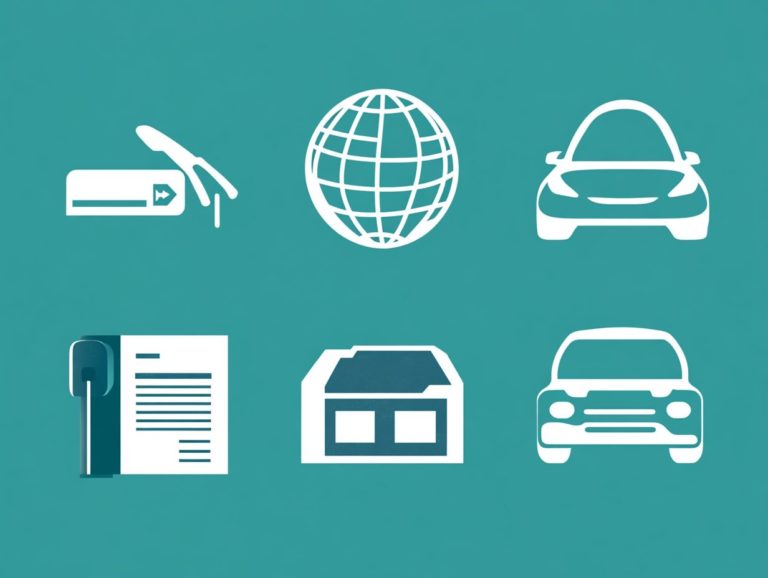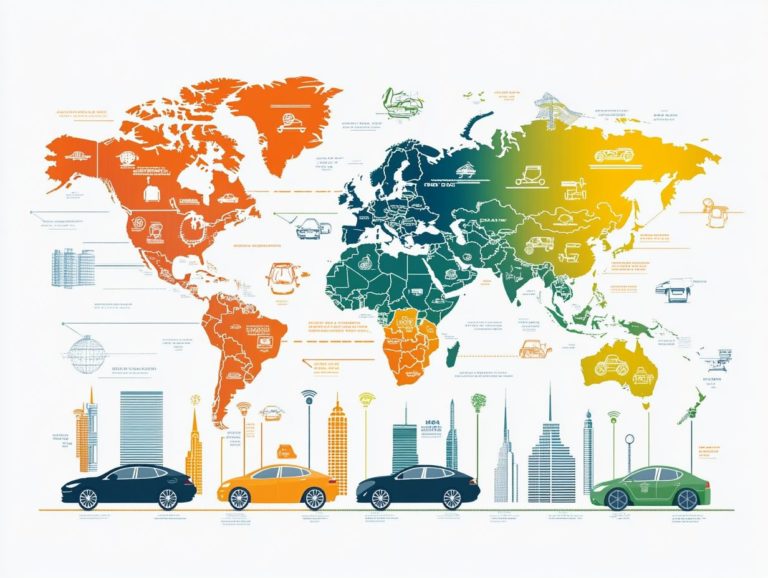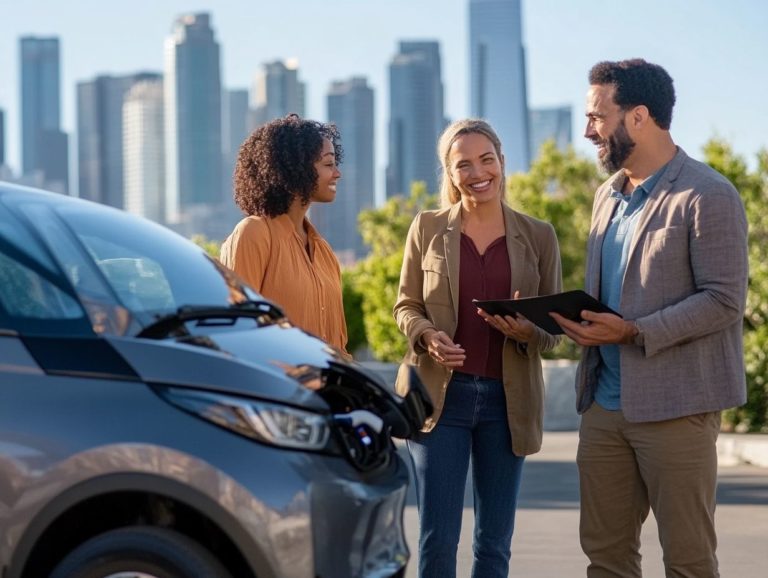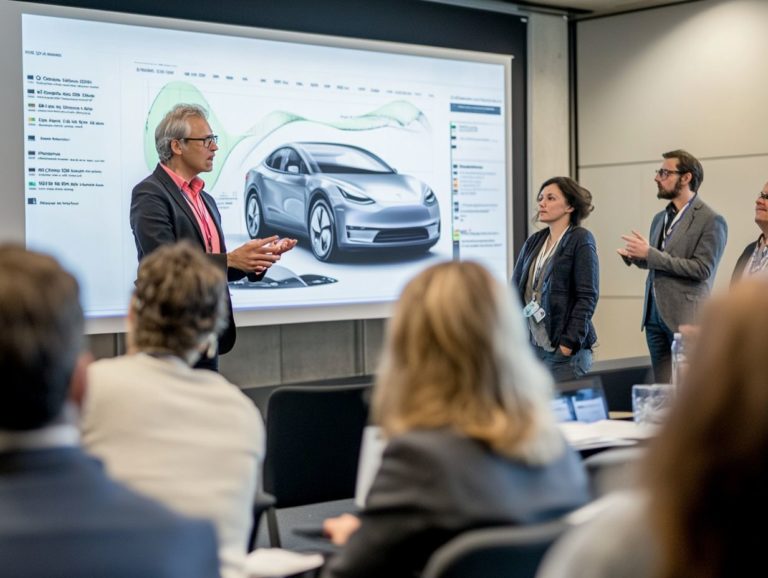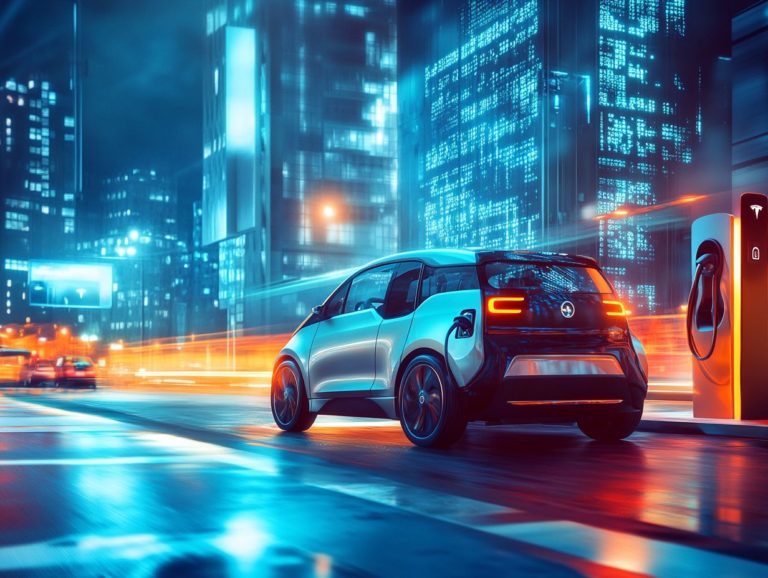5 Reasons Why EVs are the Future of Transportation
Electric vehicles (EVs) are transforming the transportation landscape, presenting a cleaner and smarter alternative to traditional gasoline vehicles.
With their environmental advantages, potential for cost savings, and impressive technological advancements, EVs are capturing the attention of consumers like never before.
Here are five compelling reasons why EVs are more than just a fleeting trend; they are an essential component of our future, supported by government initiatives, shifting consumer preferences, and the challenges that lie ahead.
Join the exciting shift towards sustainable mobility today!
Contents
- Key Takeaways:
- 1. Environmental Benefits
- 2. Cost Savings
- 3. Technological Advancements
- 4. Government Support and Incentives
- 5. Changing Consumer Preferences
- How Do EVs Compare to Traditional Gasoline Vehicles?
- Frequently Asked Questions
- What are the top 5 reasons why EVs are the future of transportation?
- How do EVs help reduce air pollution?
- Are there any disadvantages to owning an EV?
- Why are governments promoting the use of EVs?
- Can I still use an EV for long distance travel?
- Are there any maintenance differences between EVs and traditional vehicles?
Key Takeaways:
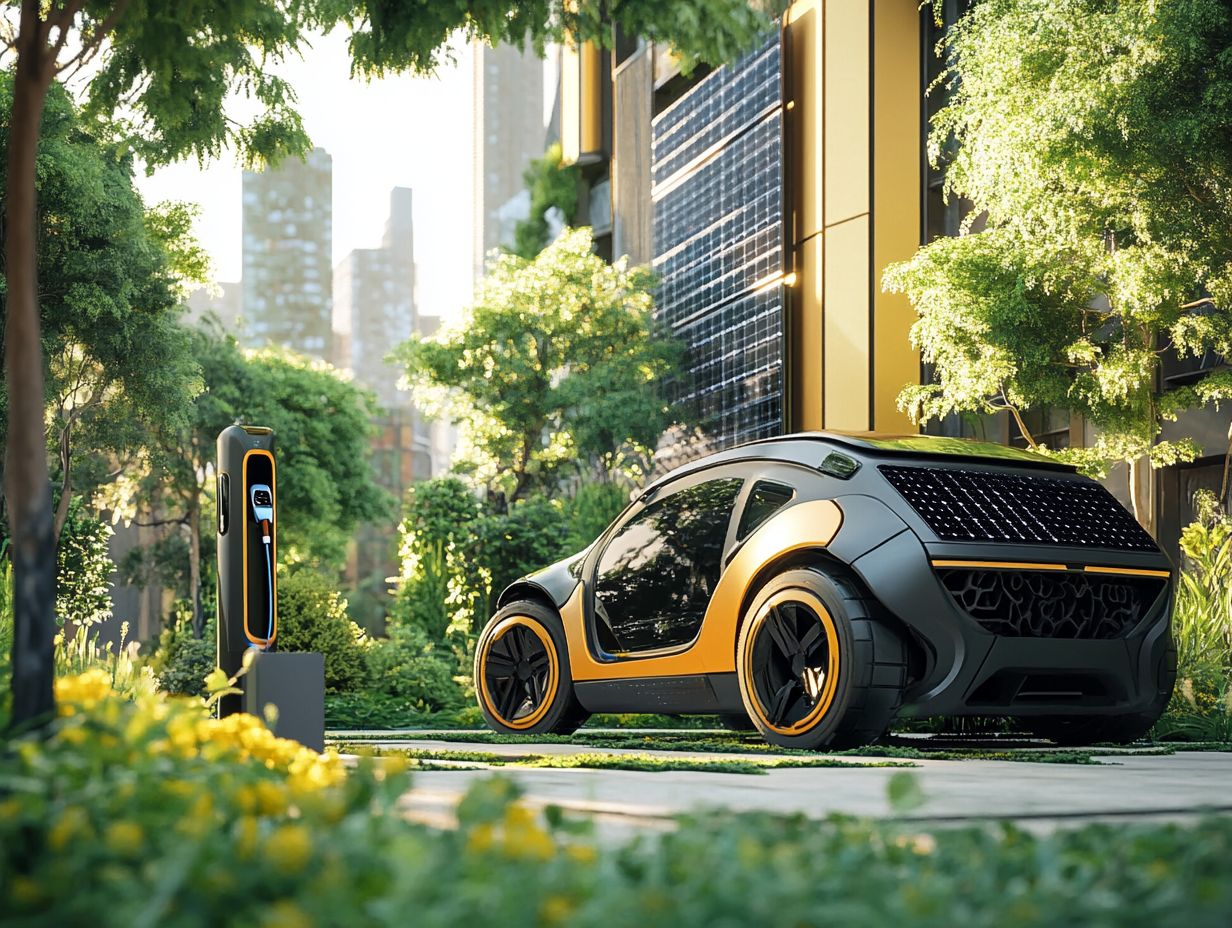
- Electric vehicles reduce carbon emissions and fossil fuels.
- They save money through lower maintenance and fuel costs.
- New battery technology makes EVs more practical for daily use.
1. Environmental Benefits
The environmental benefits of electric vehicles (EVs) are nothing short of remarkable. By significantly reducing emissions and mitigating climate change, they lead to a smaller carbon footprint compared to traditional gasoline vehicles.
With the power to run on clean electricity sourced from renewable energy like solar and wind battery electric vehicles (BEVs) and plug-in hybrid electric vehicles (PHEVs) actively diminish fossil fuels, paving the way for sustainable transportation.
These vehicles don t just provide a cleaner alternative; their no exhaust emissions play a vital role in enhancing urban air quality, which is essential for public health. By swapping out fossil fuel combustion for electric power, cities can anticipate a reduction in pollutants, leading to fewer respiratory issues and other health concerns among residents.
Transitioning to electric mobility aligns seamlessly with global initiatives to embrace cleaner energy sources. This shift not only reduces reliance on petroleum but also fosters energy sustainability, making a lasting positive impact on both the environment and community well-being.
2. Cost Savings
One of the standout benefits of electric vehicles is the impressive cost savings you ll experience when it comes to fuel economy. They offer significantly lower fuel costs compared to traditional gasoline vehicles, making EV ownership a more affordable choice over time.
You ll also find that maintenance costs for electric vehicles are generally lower. With fewer moving parts and no need for oil changes, you can enjoy a more streamlined maintenance schedule and reduced repair expenses overall.
Plus, there are various federal tax credits and state-level incentives that enable you to reap substantial financial benefits, effectively lowering the upfront cost of these eco-friendly vehicles. As these incentives become increasingly accessible, the financial allure of electric transportation continues to rise, making it a compelling option for budget-conscious drivers like yourself who are seeking long-term savings.
3. Technological Advancements
The electric vehicle industry has experienced extraordinary technological advancements, especially in the realm of advanced batteries and electric-drive technologies. These innovations significantly elevate the performance and efficiency of both electric and hybrid vehicles.
Recently, you’ve likely noticed breakthroughs in lithium-ion battery technology a type of battery that stores energy efficiently that extend their lifespan and improve charging rates. This means you can embark on longer trips without the dreaded extended wait times at charging stations.
The evolution of charging stations has also played a crucial role now equipped for rapid charging and offering increased accessibility, they ve changed how you and your fleet approach electric mobility.
These enhancements not only optimize power consumption and range but also elevate the overall driving experience, allowing for more spontaneous journeys. Ultimately, the combination of durable batteries and fast-charging solutions instills greater confidence in the transition to electric alternatives, paving the way for broader adoption across diverse demographics.
Make the switch to electric vehicles and be part of the future of transportation!
4. Government Support and Incentives
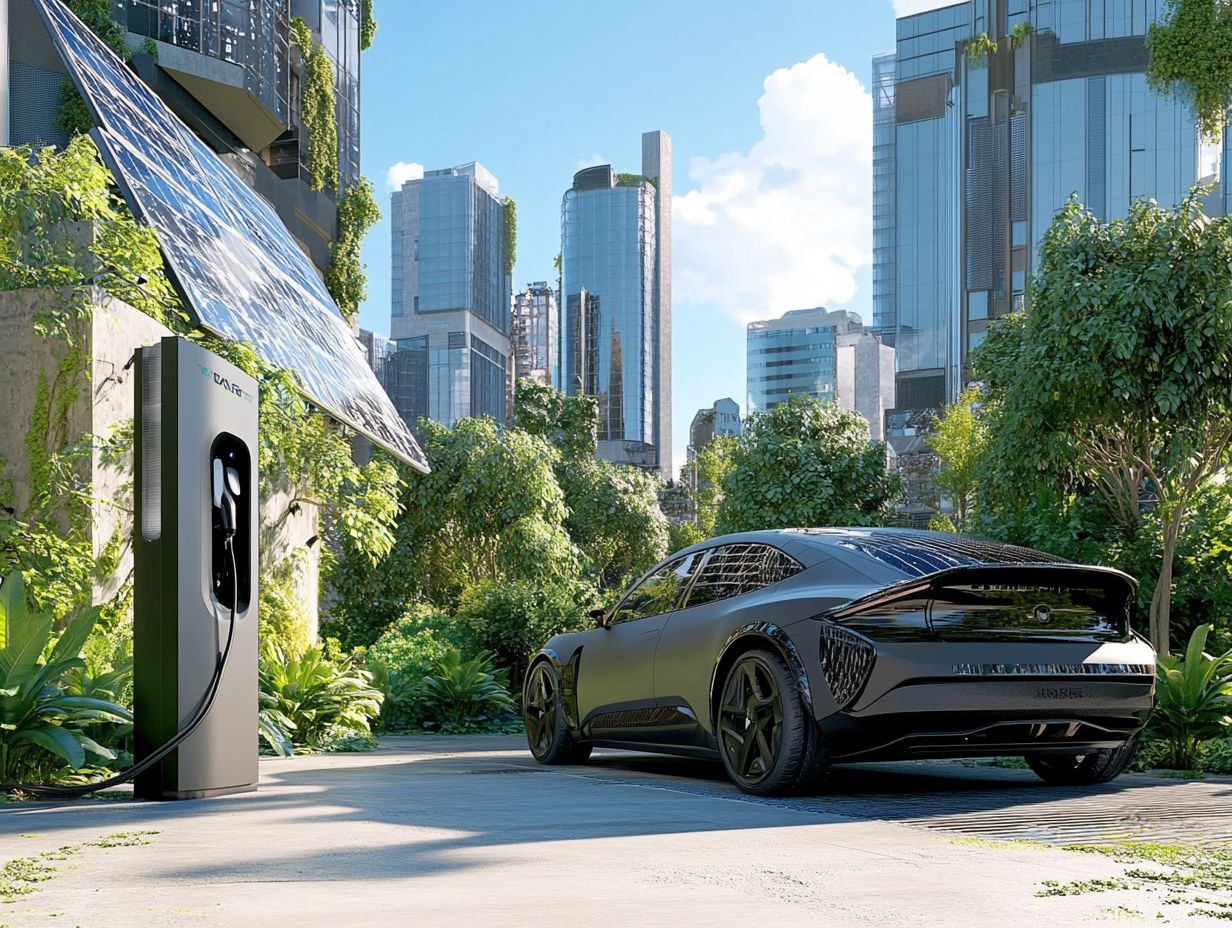
Government support and incentives are essential in driving electric vehicle adoption. Initiatives like the Inflation Reduction Act offer substantial subsidies and tax incentives. Seize the opportunity to benefit from these incentives today!
Along with federal efforts, various state and local programs provide rebates and grants designed to lower your upfront costs. The investment in public charging stations is equally vital. Without strong infrastructure, you might hesitate to switch to an electric vehicle.
Programs focused on expanding charging networks enhance accessibility and assure you of the practicality of driving electric. These initiatives play a significant role in paving the way for a cleaner energy future and simplifying your journey towards adopting sustainable practices.
They contribute to a more environmentally-friendly transportation landscape.
5. Changing Consumer Preferences
As awareness of climate change and the environmental repercussions of fossil fuels increases, your preferences are shifting toward electric vehicles. These options are increasingly seen as a more sustainable mode of transportation that enhances your driving experience.
This transformation is a lasting trend, influenced by various factors. Many consumers, like you, are becoming more mindful of their carbon footprint, leading them to explore cleaner alternatives that help reduce pollution.
Thanks to advancements in technology like better battery life and faster charging capabilities, electric vehicles are now more practical than ever. The appeal of a smooth, quiet ride, along with potential savings on fuel costs, makes it even more enticing for you to consider both battery electric and hybrid electric vehicles. Additionally, 5 ways cities are adapting to EV growth highlight how urban areas are evolving to support this shift.
This blend of sustainability, innovation, and performance is fundamentally reshaping the automotive landscape, inviting you to be a part of this exciting evolution.
How Do EVs Compare to Traditional Gasoline Vehicles?
When you compare electric vehicles (EVs) to traditional gasoline vehicles, the differences in emissions benefits, fuel economy, and overall energy efficiency become clear. Generally, EVs present lower ownership costs and a superior driving experience.
While gasoline vehicles typically rely on combustion engines engines that burn fuel to run that emit higher levels of greenhouse gases, modern EVs utilize electric motors, contributing to significantly cleaner air.
The cost of ownership for EVs has become increasingly favorable, thanks to advancements in battery technology that enhance both range and efficiency. Maintenance costs often favor electric models, which have fewer moving parts and eliminate the need for oil changes.
With the electric charging infrastructure expanding rapidly, you can enjoy even greater convenience. Coupled with the growing awareness of environmental impacts, it’s no wonder that electric vehicles are becoming a compelling choice for many consumers seeking practicality without compromising on performance.
What Are the Different Types of EVs Available?
Electric vehicles come in various types, including battery electric vehicles (BEVs), plug-in hybrid electric vehicles (PHEVs), and hybrid electric vehicles (HEVs). Each type is tailored to meet specific consumer needs with unique features and advantages.
BEVs operate solely on electricity, often providing an impressive range on a single charge. This makes them a fantastic choice for those who commute daily or rely on public charging stations.
PHEVs combine electric and gasoline power, allowing you to enjoy electric driving for shorter trips while still having the flexibility of a traditional fuel engine for longer journeys.
HEVs utilize both an electric motor and an internal combustion engine but don t require plugging in. This makes them a hassle-free option for anyone stepping into the world of electric mobility.
With so many choices available, you can easily find the perfect vehicle to suit your lifestyle while contributing to a more sustainable future. Explore your options now and be part of the electric vehicle revolution!
What Are the Challenges Facing Widespread Adoption of EVs?
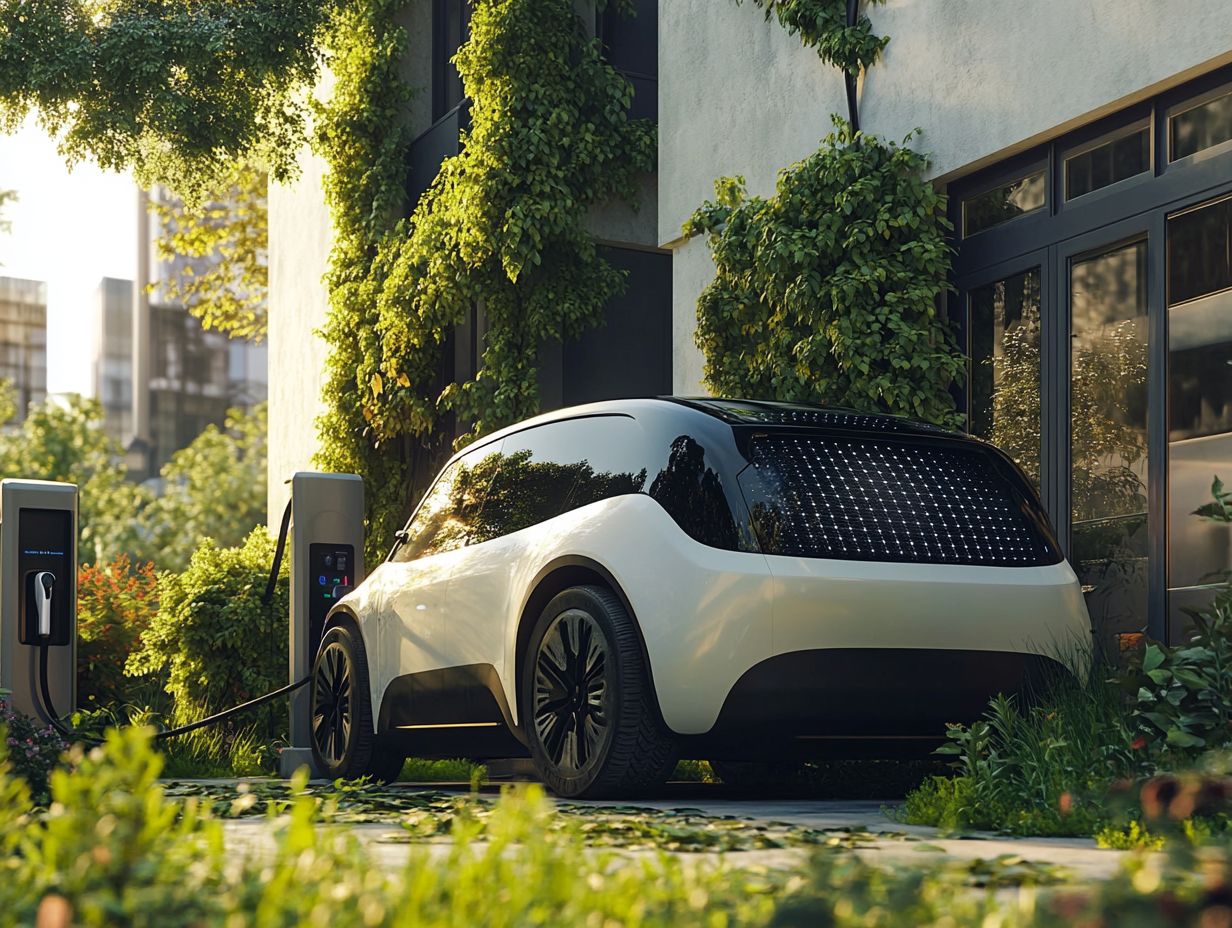
Despite the many benefits of electric vehicles, challenges can hinder widespread adoption. A key issue is the need for better infrastructure, including convenient charging stations and tools needed to charge electric cars, which can deter potential buyers.
Public misconceptions about EV reliability often stem from a lack of understanding about their operational capabilities compared to traditional vehicles. Some may also have concerns about long-term maintenance costs, which can feel daunting due to unfamiliarity with EV technologies.
Addressing these challenges requires teamwork from both public and private sectors. Expanding the charging network, investing in consumer education campaigns, and promoting incentives can ease initial adoption hurdles. By enhancing infrastructure reliability and clarifying maintenance expectations, the transition to electric vehicles can become more appealing for everyone.
How Can EV Charging Infrastructure Be Improved?
Improving the EV charging infrastructure is essential for boosting electric vehicle adoption. The availability of public charging stations and tools needed to charge electric cars builds consumer confidence and ensures convenience.
A multi-faceted approach is needed one that involves government initiatives focused on funding and policy adjustments, along with public-private partnerships that drive technological advancements and investment. Engaging local communities can lead to tailored solutions that address specific needs, paving the way for more accessible charging points.
This proactive strategy enhances infrastructure availability and elevates the overall experience for EV owners, making electric vehicles a far more appealing choice for everyday use.
What Are the Predictions for the Future of EVs?
Exciting times are ahead for electric vehicles! Predictions suggest a thriving electric vehicle industry, with 5 ways electric vehicles are changing communities through technological advancements, heightened consumer awareness, and a global shift toward sustainable transportation solutions to tackle climate change.
As battery technology advances, manufacturers will provide longer ranges and faster charging times, making electric vehicles increasingly practical for daily routines.
Preferences are shifting toward eco-friendly options, prompting automakers to prioritize electric models in their offerings.
Government incentives, like tax credits and investments in charging infrastructure, are crucial for encouraging more individuals to switch to electric vehicles. These factors are poised to drive a significant surge in EV adoption as society seeks greener alternatives.
How Can Individuals Make the Switch to EVs?
If you re considering the switch to electric vehicles, a wealth of incentives awaits you, along with insights into charging station availability and potential ownership costs to make your transition smoother and more budget-friendly.
Researching local and federal incentives can significantly lessen your upfront costs, paving a more affordable path into the EV market. Understanding your charging options whether home installations or public stations will help you plan your daily use effectively.
Evaluating the total cost of ownership, including savings on fuel and maintenance, will highlight the long-term benefits of your decision. Numerous resources, like dedicated EV websites, community forums, and dealer workshops, can provide valuable support every step of the way.
Frequently Asked Questions
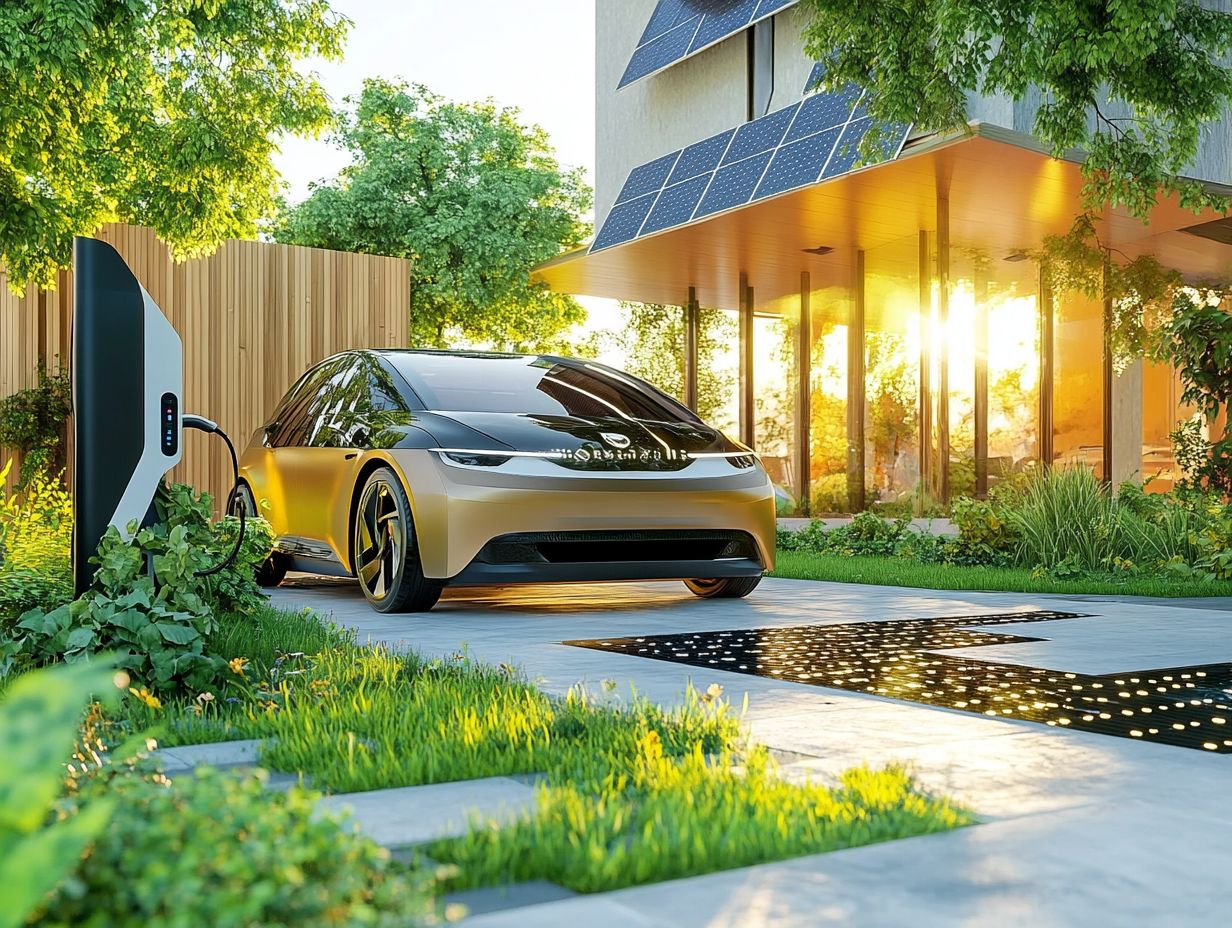
What are the top 5 reasons why EVs are the future of transportation?
1. Reduced carbon emissions: EVs produce much less carbon than traditional gas-powered cars. This makes them friendlier to the environment, and there are compelling reasons to invest in electric vehicle stocks.
2. Lower fuel costs: EVs run on electricity, which is significantly cheaper than gasoline.
3. Growing availability of charging stations: As EVs gain popularity, the number of charging stations is increasing, which is essential for supporting sustainable development goals. This makes it easy for EV owners to find a place to charge their vehicles.
4. Technological advancements: EV technology is advancing rapidly. For instance, there are compelling reasons to buy an electric vehicle in 2024, as this allows for longer driving ranges and faster charging times, making them convenient for everyday use.
5. Government incentives: Many governments offer incentives for purchasing EVs, such as tax credits and rebates. This makes them more affordable for consumers, supporting the future of transportation.
How do EVs help reduce air pollution?
EVs produce zero tailpipe emissions, meaning they do not emit harmful pollutants like traditional vehicles. This helps improve air quality and reduce smog levels in populated areas.
Are there any disadvantages to owning an EV?
Some potential disadvantages include higher initial costs and limited driving ranges. However, these issues are becoming less significant as technology improves.
Why are governments promoting the use of EVs?
Governments promote EVs to reduce carbon emissions, improve air quality, and decrease dependence on fossil fuels. They also view EVs as a way to stimulate economic growth and create jobs in the electric vehicle industry. Understanding the 5 ways to promote sustainability in EV usage can further enhance these benefits.
Can I still use an EV for long distance travel?
Yes, many EVs now have longer driving ranges! The growing number of charging stations makes it easy to find a place to charge your EV during long trips.
Are there any maintenance differences between EVs and traditional vehicles?
Yes, EVs have fewer moving parts than traditional vehicles, requiring less maintenance. They do not need oil changes or transmission fluid replacements, saving owners time and money.

